Importance Of Play In Child Development And Benefits
Play is a critical process in child development that promotes cognitive, social-emotional, and physical growth, forming a foundation for lifelong learning and well-being. Play fosters creativity, imagination, and physical strength while enhancing decision-making and problem-solving skills. Children engage in play activities that stimulate brain development and allow them to explore the world and themselves.
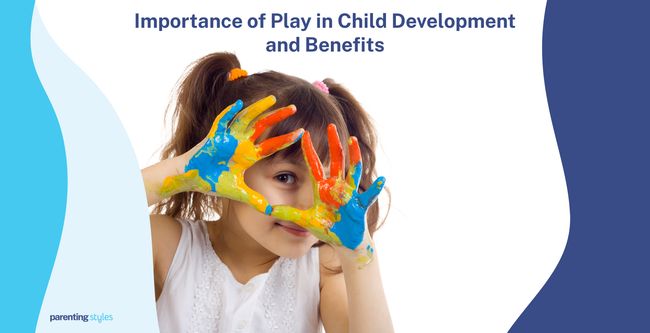
Play is a universal language for children characterized by smiles, laughter, and enjoyment. Play is a powerful learning tool that supports children’s development. Children improve their executive functioning, working memory, and self-regulation while strengthening motor skills and confidence while interacting during play. Social skills such as listening, conflict resolution, and relationship-building flourish through playing.
The importance of play in child development lies in its ability to improve cognitive, physical, social, and emotional well-being. Play provides a safe environment for children to learn, experiment, and grow, which enhances their confidence and resilience. Play helps children develop skills needed for success in school, work, and relationships by offering opportunities to understand their world, bodies, and emotions.
Play enhances cognitive growth by enhancing memory, language, and problem-solving skills. Play helps children build physical strength, agility, and balance. Play teaches children about social cooperation, turn-taking, and relationship-building. Play helps children manage their feelings and build emotional resilience, essential for handling stress and anxiety.
Play is critical for brain development, supporting sensory development, abstract thinking, and time management. Play allows children to engage in problem-solving and leadership roles, preparing them for the future. Playing connects children to cultural values, reflecting these through imaginative activities.
The benefits of play are vast, including promoting intelligence, creativity, communication, impulse control, and social competence. Early play stimulates brain development by creating neuron connections that serve as building blocks for later growth. Play improves intelligence, as studies show it is associated with higher IQs and better cognitive, linguistic, and social skills. Imaginative play sparks creative thinking by encouraging divergent thinking, allowing children to explore multiple solutions to problems.
Pretend play enhances communication skills, vocabulary, and language development, where children practice new words and concepts. Dramatic play promotes emotional regulation and impulse control, critical skills for academic and social success. Social play strengthens empathy, cooperation, and conflict resolution, helping children become more socially competent.
Play supports physical and mental health, teaches life skills, strengthens relationships with caregivers, and prepares children for academic success. Children learn problem-solving, empathy, and perspective-taking, all crucial for their development.
Types of play vary from solitary to cooperative, each contributing differently to skill development. Challenges in play include time constraints, adult interference, cultural values, and individual differences, including developmental delays. Consistently refusing to play sometimes indicates developmental concerns, such as autism spectrum disorder or motor challenges, requiring a professional assessment to support their needs and development.
What is the Meaning of Play in Child Development?
The meaning of play in child development is a complex process critical for cognitive, social-emotional, and physical growth. Play provides an important foundation for lifelong learning and well-being.
Play provides children with activities that stimulate creativity, imagination, and dexterity, building physical and cognitive strength. Play promotes healthy brain development, allowing children to explore the world and themselves in a flexible, goal-oriented manner. Constructive play encourages using objects in new combinations, experimenting with roles, enhancing decision-making skills, and exploring different possibilities.
Play is recognized as a universal language of childhood, often accompanied by smiles, laughter, and a sense of enjoyment. Research underscores the importance of play in child development as a powerful learning mode that supports physical, intellectual, social, and emotional development. Playing kids develop cognitive well-being by pretending and interacting with others to enhance executive functioning, working memory, flexible thinking, and self-regulation. Children’s physical development benefits from honing motor skills and building confidence.
Social skills such as listening, paying attention, resolving conflict, and developing relationships with peers and caregivers are strengthened through play. Play supports language development as children learn new words and concepts while exploring their world. Play allows children to navigate adult roles, process fears, and make sense of their experiences. Playing is not only an enjoyable activity done for its own sake but is essential to the holistic development of young people, according to a 2018 study titled “The Power of Play: A Pediatric Role in Enhancing Development in Young Children” by Michael Yogman et al., published in Pediatrics.
What is the Importance of Play in Child Development?
The importance of play in child development lies in its role in improving cognitive, physical, social, and emotional well-being. Kids playing are having fun and learning through play, which helps them explore the world and understand themselves. Children learn critical skills that help them study, work, and build relationships, building their confidence and resilience through play.
Play improves children’s abilities to plan, organize, get along with others, and regulate emotions. Play creates a safe place for children to develop essential skills and thrive. Playing helps children learn and grow by offering opportunities to explore the world and master relationships, language, math, science, problem-solving skills, and knowledge about their bodies.
Studies have shown that the benefits of play include improved language skills, problem-solving abilities, and math proficiency. Engrossed in play, children feel safe and secure, allowing them to experiment with new ideas and develop mindfulness. Play not only helps children grow emotionally by providing a joyful outlet for anxiety and stress, but it reduces stress, making play an essential aspect of their well-being, according to a 2018 study from the Netherlands titled “Healthy play, better coping: The importance of play for the development of children in health and disease,” conducted by Christiaan H. Vinkers et al. at Utrecht University and published in Neuroscience & Biobehavioral Reviews.
Play facilitates cognitive growth by helping children develop memory, language, and problem-solving skills. Engaging in play helps children physically build strength, agility, coordination, and balance. Play encourages social interaction, teaching them to build relationships and take turns. Play helps children emotionally by managing their feelings, developing empathy, and building resilience.
Play is crucial for brain development. Play helps children grow in confidence, self-esteem, and independence by allowing them to make decisions and explore their curiosity. Play connects children to cultural values, reflecting and transmitting these values through imaginative activities.
What are the Benefits of Play in Child Development?
The benefits of play include promotion in early brain development, intelligence, creative thinking, communication, impulse control, social competence, physical and mental health, life skills, relationships, and school readiness. Below are the 10 benefits of playing in children’s development.
- Stimulate Early Brain Development: Play accelerates early brain growth by enhancing neural connections.
- Improve Intelligence: Engaging in play nurtures cognitive skills and boosts intelligence.
- Spark Creative Thinking: Play encourages imaginative exploration and innovative problem-solving.
- Improve Communication, Vocabulary, And Language: Play develops verbal skills, enriching vocabulary and language comprehension.
- Promote Impulse Control And Emotion Regulation: Play teaches patience and helps children regulate emotions effectively.
- Grow Social Competence And Empathy: Play builds social skills and deepens empathy through shared experiences.
- Better Physical And Mental Health: Play promotes fitness, reduces stress, and improves overall well-being.
- Teach Life Lessons: Play introduces important life skills like cooperation, resilience, and conflict resolution.
- Strengthen Relationships with Caretakers And Peers: Play fosters strong bonds with parents, caregivers, and friends.
- Academic Readiness: Play prepares children for school by enhancing focus, problem-solving, and learning motivation.
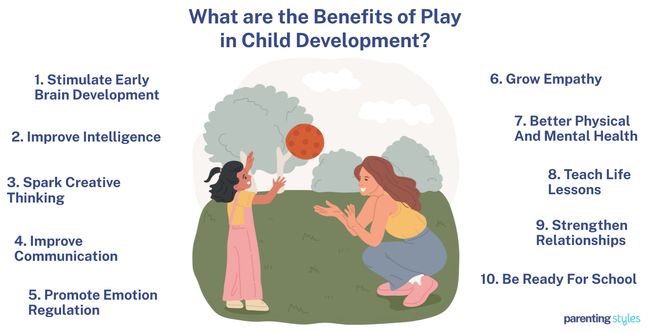
1. Stimulate Early Brain Development
Play stimulates early brain development by encouraging the formation of connections between nerve cells (synapses). Play engages the neocortex, the outermost layer of the cerebral cortex responsible for higher-order functions like thought, perception, and consciousness. Planning and decision-making while playing exercises the prefrontal cortex (front of the neocortex). Active movements during play activate various neurological brain regions, helping to improve cognitive functions like sensory integration or the ability to understand information from multiple senses simultaneously, according to a 2010 study from The United States titled “The Importance of Play in Early Childhood Development,” conducted by Jona K. Anderson-McNamee et al. at Montana State University and published in Montana State University Extension.
2. Improve Intelligence
Play enhances cognitive thinking skills, magnifies the importance of senses, and reinforces memory and attention. Creative play helps strengthen a child’s abilities to plan and organize, get along with others, and regulate emotions. Play engages brain activities and critical thinking. Playing is associated with multiple intelligences, including verbal, interpersonal, intrapersonal, logical, spatial, musical, and bodily intelligence, according to a 2011 study titled “Playing with the Multiple Intelligences How Play Helps Them Grow,” by Scott G. Eberle, published in the American Journal of Play.
3. Spark Creative Thinking
Play sparks creative thinking by integrating cognitive skills, personality factors, motivation, and mental processes to produce new ideas. It lets children explore emotions, solve problems, and experiment with various situations. Activities like building blocks involve trial and error and strengthen problem-solving skills. Fantasy play, such as role-playing, offers opportunities for imaginative thinking through experimentation with roles, language, and emotions. Supportive environments at home and school play a crucial role in fostering children’s creativity, according to a 2017 study from Australia titled “Early Childhood Creativity: Challenging Educators in Their Role to Intentionally Develop Creative Thinking in Children,” conducted by Nicole Leggett at the University of Newcastle and published in Early Childhood Education Journal.

4. Improve Communication, Vocabulary, and Language
Play enhances children’s communication, vocabulary, and language through imaginative roles and imitation. Children expand their vocabulary and language skills by modeling peers and adults in pretend play. Activities like playing house encourage storytelling, as children create narratives around their roles. Make-believe scenarios prompt children to communicate and collaborate with playmates, further improving language and turn-taking skills, according to a 2005 study from Germany titled “Role Play and Language Development in the Preschool Years,” conducted by Helga Andresen at the University of Flensburg, Germany and published in Culture & Psychology.
5. Promote Impulse Control and Emotion Regulation
Impulse control refers to the ability to resist urges or temptations and think before acting, while emotion regulation is the ability to identify, understand, and manage emotions. Play encourages impulse control by teaching children that breaking the play’s roles or rules disrupts the entire play world. Children engaging in a game of pretend restaurant understand that refusing to serve the pretend meals causes the play to collapse. Play promotes emotion regulation as children negotiate and accept other’s feelings. For example, children in a pretend tea party discuss and agree on the menu instead of proceeding with their individual preferences to avoid conflict and maximize the pleasure of playing, according to a 2014 study titled “Does play promote self-regulation in children?” by Elena Savina, published in Early Child Development and Care.
6. Grow Social Competence and Empathy
Play helps children develop social competence through interacting, forming relationships, and practicing prosocial behaviors such as helping or empathizing with peers. Play enhances emotional awareness, perspective-taking, and self-regulation, fostering children’s social development and strengthening bonds that support future interpersonal connections. Activities like pretend play allow kids to demonstrate cooperation and emotional understanding, further improving social competence, according to a 2018 study titled “The Impact of Social Play on Young Children” by Elizabeth Whitman, published in Integrated Studies.

7. Better Physical and Mental Health
Play promotes better physical and mental health outcomes among children. Physical activities coordinate gross and fine motor skills through activities such as running, jumping, climbing, and building blocks, aiding in muscle strength development. Engaging in repeated active movements helps improve motor elements like strength, durability, agility, coordination, speed, and coordination. Play is good for mental health. Playing allows children to express emotions like frustration and rage, fostering resilience to cope with environmental changes. Children playing together learn to cooperate, overcome problems, and negotiate, allowing for increased resources in responding to life’s challenges, according to a 2018 study from the Netherlands titled “Healthy play, better coping: The importance of play for the development of children in health and disease,” by Christiaan H. Vinkers et al., published in Neuroscience & Biobehavioral Reviews.
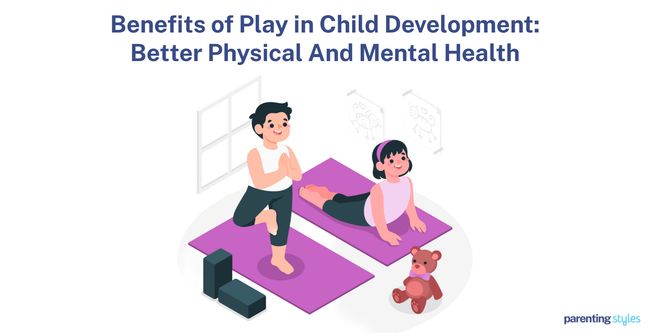
8. Teach Life Lessons
Play helps children practice and develop problem-solving skills. Children learn to cope with struggles by acting out life’s problems in pretend play. Pretend play provides a safe opportunity for children to rehearse skills and future social roles. Trying out various roles in imaginary play allows children to take on different perspectives, further assisting them in abstract thinking.
9. Strengthen Relationships with Caretakers and Peers
Play helps children form emotional bonds with caretakers and peers. Loving interactions during shared play allow children to feel valued by their parents, strengthening parent-child relationships. Communication improves when parents use play to view the world from their child’s perspective. Rough-and-tumble play often serves as an expression of friendship and a way to develop peer bonds, according to a 2000 study titled “Friendship Formation and Boys’ Rough and Tumble Play: Implications for Teacher Education Programs,” by Thomas L. Reed et al., published in Journal of Early Childhood Teacher Education.
10. Become Academically Ready
Play helps children become academically ready for early childhood education (ECE) by allowing them to build a strong foundation in executive functions. Children’s memory, social skills, and language abilities improve through play. These abilities form the basis of pre-reading skills essential for literacy. Purposeful play improves school readiness, according to a 2011 study titled “Purposeful Play Leads to School Readiness,” by Jaesook L. Gilbert et al., published in Dimensions of Early Childhood.
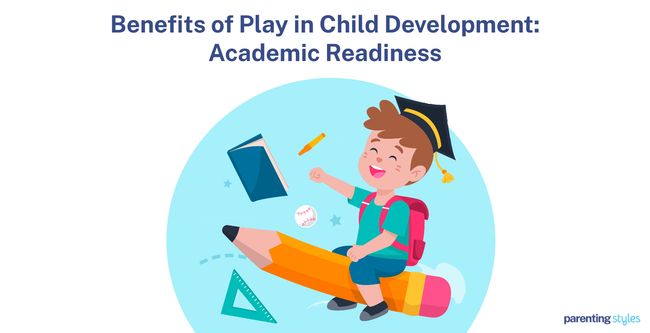
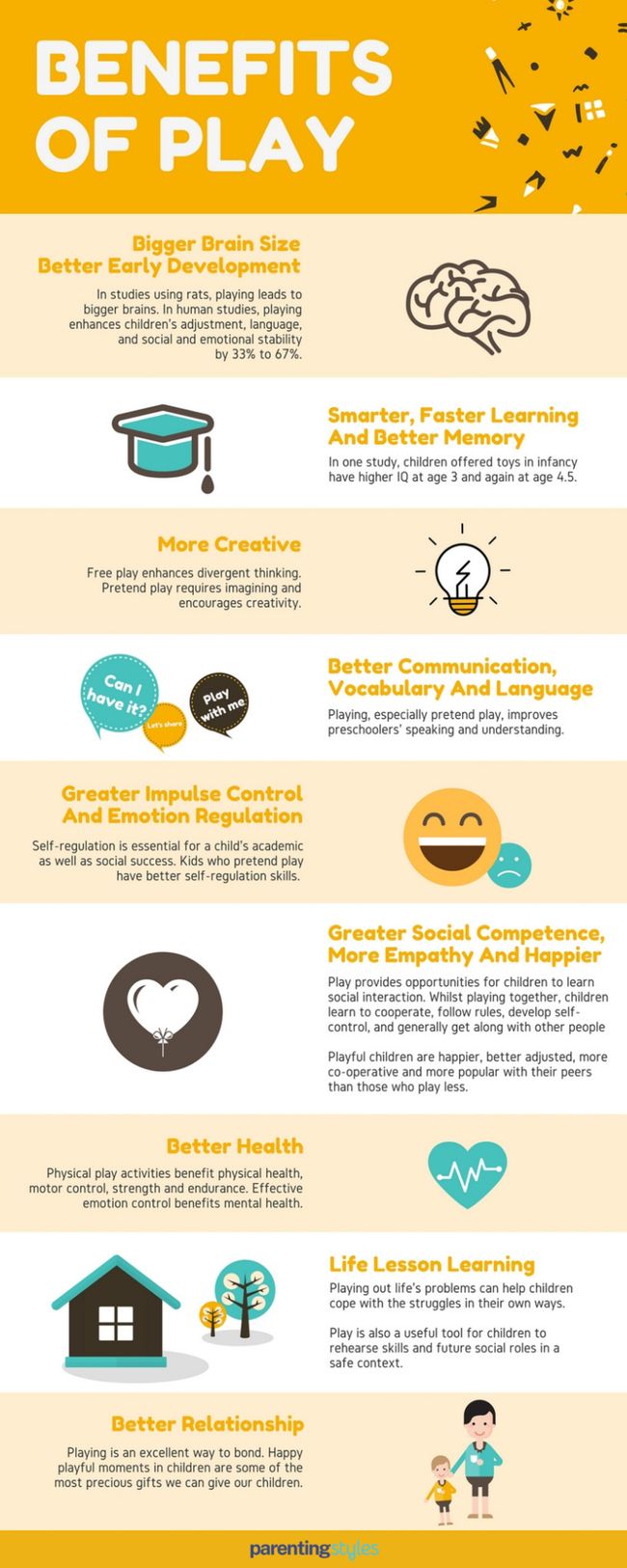
What Are The Types Of Play In Child Development?
The 11 Types of play in child development are unoccupied, solitary, symbolic, spectator, parallel, associative, dramatic, fantasy, competitive, physical, and constructive plays. Below are the types of play children engage in, according to a 2017 study titled ” 3 Conceptual Review of Play,” by Daniela Bulgarelli and Nicole Bianquin, published in Play Development in Children with Disabilities.
- Unoccupied Play: Unoccupied play is the initial stage of play, in which a child does not engage in play and only observes the environment without interacting with anyone or anything. Children engaging in unoccupied play typically perform random movements like squirming and reaching without a clear goal or intention.
- Solitary Play (Birth-2 Years): Solitary play occurs from birth to 2 years and involves playing alone without interacting with other people or objects. Children become preoccupied with grabbing and rattling toys or objects, often unaware of people nearby due to limited physical, cognitive, and social skills, according to a 2023 study from The United States titled “Peer Play,” conducted by Hannah K. Scott et al. at Louisiana State University and published in StatPearls.
- Symbolic Play (18 months): Symbolic play refers to various pretend play behaviors, such as engaging in dress-ups or role plays. Transition to symbolic play is typically characterized by using sound effects and gestures, later developing into combining mental representations into sequences (like feeding a doll with a stick) as symbolic ability increases, according to a 2015 study titled “Symbolic play and language development,” by Ronny Geva et al., published in Infant Behavior and Development.
- Spectator/Onlooker Behavior (2 Years): Onlooker play typically happens at 2 years, when a child watches others play without joining. Children express curiosity with peers and begin learning to socialize. Some engage in conversations without participating in activities. Children in the onlooker play stage continue to play alone until prepared to interact with others.
- Parallel Play (2+ Years): Parallel play occurs when children play alongside each other, engaging in similar activities without direct interaction. Each child uses individual toys and plays independently, helping to understand the concept of ownership while expressing the desire to socialize with peers. Children often engage in parallel play through role-playing activities like pretend play and dressing up.
- Associate Play (3-4 Years): Associate or social play involves two or more children interacting, communicating, and developing relationships. Increased contact with peers helps children develop moral values and learn social rules like cooperation, sharing, and turn-taking. Associate play typically becomes prominent between ages three and six as children grow more aware of their peers and seek gratification from adult interactions.
- Cooperative Play (4+ Years): Cooperative play occurs when children become more interested in activities performed by others and display interest in playing together. Children typically share toys, communicate wants and ideas, and collaborate with peers, which facilitates the development of skills crucial for communication and socialization, such as compromising and turn-taking.
- Dramatic or Fantasy Play: Children engage in dramatic or fantasy play by creating imaginative scenarios and taking on different roles, allowing them to experiment with language and emotions. Activities like dressing up and role-playing help children recognize and express feelings, cooperate with peers, control impulses, and learn self-regulation skills.
- Competitive Play: Competitive play involves games with set rules children must remember and follow. Children engaging in competitive play learn to cooperate, take turns, and recognize that not every player wins, which is often challenging due to a kid’s egocentric nature (seeing the world only from their perspective). Competitive plays typically include games like “Go Fish” and “Simon Says”, helping children develop important skills for adhering to rules, especially within school settings.
- Physical Play: Physical play includes activities utilizing gross motor skills, such as walking, running, jumping, and climbing. Such activities help children stay active and develop muscle strength. Children often engage in physical play by participating in strenuous and sometimes risky activities like climbing rocks, walls, or monkey bars.
- Constructive Play: Constructive play involves an organized and goal-oriented play that typically starts in toddlerhood and becomes more complex with practice. Children engage in constructive play by building objects with blocks or Legos, allowing for open-ended exploration that promotes a child’s creativity, imagination, and problem-solving skills.
What Are The Challenges Of Play In Child Development?
Challenges of play in child development include limited time and space, adult interference, cultural factors, and individual differences.
Over-scheduling children with structured activities, urban living, and encroachment of screen time make unstructured play challenging. Adults’ over-involvement or under-involvement impacts children’s ability to fully benefit from play experiences. Traditional gender roles in some cultures limit the types of play activities considered appropriate for boys and girls. Some societies emphasize academic achievement over playing. Children with developmental delays or sensory sensitivities often require additional support to enjoy play activities.
How Does Play Influence Physical Development In Children?
Play influences physical development in children by improving motor skills. Active play, such as ball catching and walking on a balance beam, involves repeated muscle movements, improving children’s strength, durability, agility, speed, and coordination.
Goal-oriented play consists of a series of activities that target different specific skill sets. Children who participate in goal-oriented play improve gross (large muscle) and fine (small muscle) skills, according to a 2021 study, “Improving Motor Skills in Early Childhood through Goal-Oriented Play Activity.” Children perceive the physical activities in goal-oriented play as fun, enabling eagerness to do and repeat muscle movements.
Physical play further influences physical development by preventing obesity and diabetes, improving bone density, increasing heart and lung functions, and strengthening muscles. Children with developed motor skills are more active in physical activities, leading to better overall health.
How Does Play Influence Cognitive Development In Children?
Play influences cognitive development in children by stimulating various mental processes. Games and puzzles increase children’s problem-solving skills. Pretend play, such as playing house, enhances creativity and language skills by allowing children to practice roles and model adult behaviors, according to a 2010 study titled “The Importance of Play in Early Childhood Development,” conducted by Jona K. Anderson-McNamee et al. of Montana State University and published in the Montana State University Extension.
Play provides the foundation for academic learning, according to a 2018 study titled “The impact of play on child development – a literature review,” conducted by Ngan Kuen Lai et al. and published in the European Early Childhood Education Research Journal. Children acquire problem-solving, language, and literacy skills by directing the content of their play, resulting in the development of higher executive functions needed for academic success.
Playing games with rules allows children to gain perspective by encouraging cooperation and consideration of others’ viewpoints. Following and remembering game rules strengthens children’s working memory, reinforcing cognitive skills essential for social interactions and problem-solving, as detailed in a 2014 study titled “Does play promote self-regulation in children?” by Elena Savina and published in Early Child Development and Care.
How Does Play Influence Language Development In Children?
Play influences language development in children by providing opportunities for language practice and acquisition. Children improve self-directed (private) speech by imagining roles and mimicking adults during pretend play. Participating in make-believe scenarios provides opportunities for rich conversational exchanges between other children, according to a 2018 study titled “The Impact of Social Play on Young Children” by Elizabeth Whitman of Murray State University and published in the Integrated Studies.
Play facilitates language development as children have to signal others about the intentions of their behaviors. For example, a child playfully biting a playmate must communicate that the bite is not intended as a real bite to avoid misunderstandings, according to a 2005 study, “Role Play and Language Development in the Preschool Years,” conducted by Helga Andresen in Germany and published in Culture & Psychology.
Playing in classes improves language skills when teachers make specific comments on children’s works. Children are encouraged to think about their creations and describe the work in their own words, according to a 2018 study, “The Impact of Social Play on Young Children,” by Elizabeth Whitman and published in the Integrated Studies.
How Does Play Influence Social-Emotional Development In Children?
Play influences emotional development by increasing children’s self-awareness. Engaging in pretend play increases children’s ability to distinguish pretend from reality and to recognize the intentions behind other’s behaviors.
Self-regulation, the ability to control emotions, thoughts, and behaviors, often improves through playing. The need to negotiate differences and desires helps children become more aware of others’ feelings, according to a 2014 study, “Does play promote self-regulation in children?” by Elena Savina and published in Early Child Development and Care. For example, when a child wants to play with a toy that another child is already using, negotiating a solution, like taking turns or sharing, encourages children to become more attuned to each other’s emotions.
Play facilitates the development of empathy as children are guided not to inflict harm on others, according to a 2018 study titled “The Power of Play: A Pediatric Role in Enhancing Development in Young Children,” conducted by Michael Yogman et al. and published in Pediatrics. Children follow agreed-upon rules and roles in pretend play and learn to inhibit impulsive reactions to prioritize harmony and maximize the enjoyment of activities.
What Happens If A Child Does Not Want To Play?
It’s normal for a child to not want to play sometimes. Feeling tired, overwhelmed, or simply not in the mood are common causes. It’s important to respect children’s feelings and give them space to rest or do something else they enjoy. Forcing a child to play often leads to frustration and resentment.
Offering alternative activities that are less stimulating, like reading a book together or doing a quiet puzzle, helps. Check in with the child to see if something is bothering them or if they need help. It is hard for young children to articulate their feelings. Be patient and understanding.
Consistently refusing to play is sometimes a sign of an underlying issue, such as anxiety, depression, or a developmental delay. Consult your pediatrician or a mental health professional to rule out serious problems and get appropriate support.
Is Lack Of Interest To Play A Symptom Of Developmental Delay?
Yes, a lack of interest in play is a symptom of developmental delay. Infants engage in sensorimotor play as early as 9 months old by taking objects in and out of containers or banging blocks together. Solitary and functional play begins at 13 months old, while pretend play emerges at 18 months old. Babies engage in parallel play at around 24 months old, according to a 2016 study titled “Developmental Milestones,” conducted by Rebecca J. Scharf et al. and published in Pediatrics in Review.
The lack of interest in playing is sometimes due to severe motor delays. Difficulty with motor skills such as crawling, walking, or running limits children’s opportunities to initiate and engage in playing. Children with physical disabilities spend more time on passive activities such as watching television and have less involvement with objects.
A persistent lack of interest in pretend play at 3 years old is common among children with Autism Spectrum Disorder (ASD), according to a 2007 study titled “Longitudinal Study of Pretend Play in Autism,” conducted by M.D. Rutherfoood et al. and published in the Journal of Autism and Developmental Disorders. ASD is a neurodevelopmental disorder commonly characterized by developmental delays such as difficulty using words, images, or gestures to represent objects that are not physically present (symbolic capacity), language that evokes emotions (affecting language), and gestures. Deficits in having shared attention (shared focus of two individuals on an object) impair children’s ability to take in other perspectives, leading to failure in understanding pretend play.
When To Consider Seeking Help?
Consider seeking help when your baby does not engage in interactive plays like peekaboo. The lack of sensorimotor play between 9 months and 2 years old suggests developmental delay. Children with sensory integration disorders have difficulty perceiving and processing sensory information from the environment, resulting in impaired play functioning.
Persistent deficits in social communication, such as lack of engagement in pretend play by 18 months old, difficulties in nonverbal communication, and challenges in reciprocating social interactions, are signs of autism spectrum disorder (ASD). Consider seeking help if deficits in social communication are accompanied by restricted and repetitive behaviors, interests, or activities, as recommended by a 2018 study, “Autism Spectrum Disorder,” by Catherine Lord et al. and published in The Lancet.
Noticeable inactivity in group play situations inconsistent with the child’s age is one of the signs of developmental coordination disorders (dyspraxia), according to a 2006 study titled “How Does a Child With Sensory Processing Problems Play?” conducted by Jeryl D. Benson et al. and published in International Journal of Health Sciences and Practice. Dyspraxia is a neurological condition involving difficulty planning and executing motor skills due to perceptual problems. Children with dyspraxia choose to play alone or watch other children play, as problems in executing motor movements lead to challenges in social interactions. Consult a healthcare provider if you notice other abnormal behavior, such as difficulty performing routine tasks.
What Readers Are Saying
It was able to make me aware of many things that I didn't know.i'm impressed by this article alot.
This article gave insight how play can help children learn and grow and with the examples I'll be able to help my children.
it helped me understand how play helps developed different skills that children can use